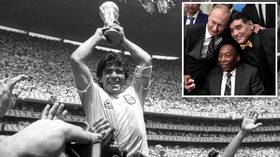'The greatest player I've ever seen, by some way': Football world stunned as global icon Diego Maradona passes away

The global footballing community has reacted in a collective state of grief and shock at the sudden passing of Argentinian football icon Diego Maradona, whose death was confirmed by his attorney on Wednesday afternoon.
Well before the decade-long debate as to who is the better player, Cristiano Ronaldo or Lionel Messi, there was one central theme which ran through many idle football conversations on terraces and in pubs the world over; who is the greatest of all time?
Also on rt.com Diego Maradona dead: Argentinian football legend passes away aged 60For a while, there was truly only one answer: Pele. But then, towards the end of the 1970s, whispers began to emerge from the Argentinian Primera Division of a young, diminutive magician with an almost supernatural command of the ball.
From there, the legend of Diego Armando Maradona would only grow further.
Eternas gracias. Eterno Diego. pic.twitter.com/SZVNOJnZ1j
— Boca Jrs. Oficial (desde 🏡) (@BocaJrsOficial) November 25, 2020
Per Sempre 💙 Ciao Diego pic.twitter.com/LzppqlBqLV
— Official SSC Napoli (@sscnapoli) November 25, 2020
FC Barcelona expresses its deepest condolences regarding the death of Diego Armando Maradona, a player for our club (1982-84) and an icon of world football. Rest in peace Diego
— FC Barcelona (@FCBarcelona) November 25, 2020
His irrepressible skill soon took him to Europe for two contentious seasons in Barcelona, blending both his sublime skill and his hot temper into one fiercely combative package. Maradona's best domestic form would come in his seven years in Italy with Napoli, but his majesty came most to the fore when he dragged his native country to win the 1986 World Cup.
His performance in that tournament, and particularly against England in the quarter-final, was Maradona to a tee. His first goal in the 2-1 win, the infamous "Hand of God," was Maradona at his most opportunistic. His second was Maradona at his most skillful.
Another man who was on that pitch that summer's day in Mexico, Gary Lineker, led the tributes to Maradona by describing him as "arguably the greatest of all time."
Reports from Argentina that Diego Armando Maradona has died. By some distance the best player of my generation and arguably the greatest of all time. After a blessed but troubled life, hopefully he’ll finally find some comfort in the hands of God. #RipDiego
— Gary Lineker (@GaryLineker) November 25, 2020
We only heard about the 'Hand Of God' as a myth but Maradona made that fairytale a reality. An icon. Rest In Peace Legend. We will never forget 💔 pic.twitter.com/Xcy0Nw8KWn
— DEEP (@PopularOnyeka) November 25, 2020
This wasn’t just the greatest goal of all time. This was the moment Diego Maradona’s Argentina flicked the bird to England just 4 years after the war. pic.twitter.com/42BHEkoDyj
— Scot Williams (@scotwilliams) November 25, 2020
Of course, it wasn't always plain-sailing for the deeply-flawed Maradona. He would struggle with drugs and alcohol throughout much of his career, leading to high profile showdowns with both his club and global footballing bodies.
After winning the World Cup in 1986 and getting the final four years later, an aging Maradona was sent home in disgrace from the 1994 tournament in the United States after failing a drug test. He would never play for his national team again, and his domestic career flamed out soon after.
Diego Maradona has died according to reports.The greatest player I've ever seen, by some way.The ultimate maverick personality, the ultimate football legend.Rest in peace, legend. pic.twitter.com/y9FahQygtg
— Stan Collymore (@StanCollymore) November 25, 2020
A flawed genius, sure, but also a genius that gave us some of the most incredible football moments of all time...What he did for Argentina and Napoli was remarkable. A legend has fallen.Remember Diego Maradona for things like this: pic.twitter.com/RVOmetTmml
— Joe Crann (@YesWeCrann) November 25, 2020
Glad to see that Maradona's final act was to overshadow this https://t.co/jE3dsh2QA3
— Major Charles Remembrance (@JoeStephenson96) November 25, 2020
But, as is being noted by the reams of social media reactions flooding Twitter, Maradona's flaws were part of the deal. Genius has a counterbalance and Maradona was never far from his.
But for all his transgressions, Maradona was a uniquely relatable figure. He did on the football pitch what we all wanted to do, and did off the pitch what we were always told to stay away from.
And in those 60 years, he surely lived more than one lifetime.












